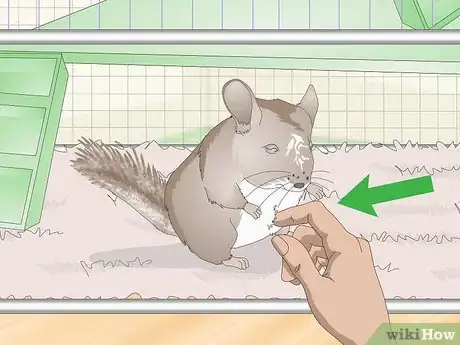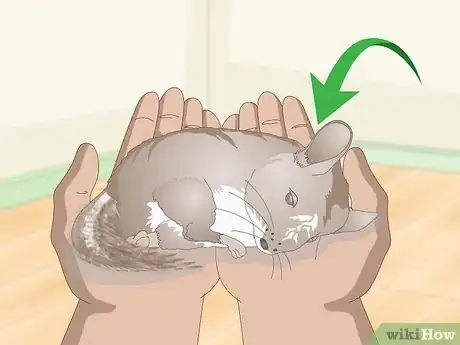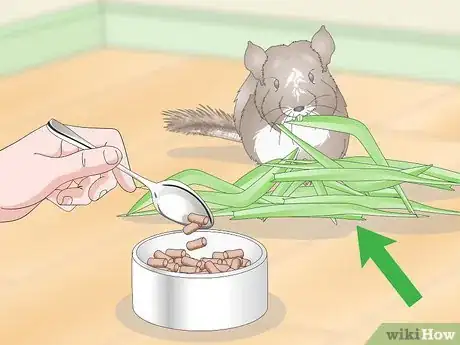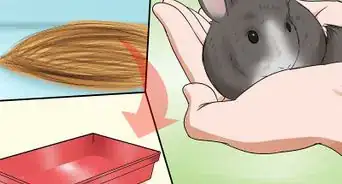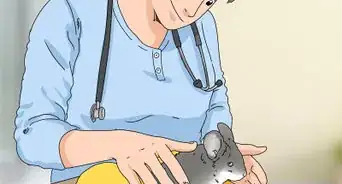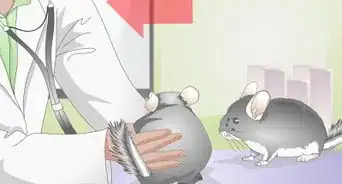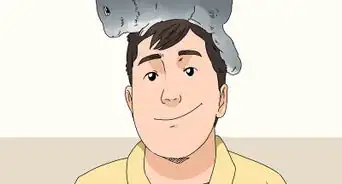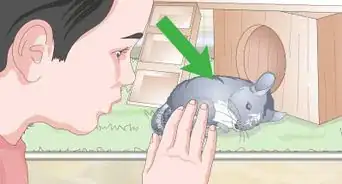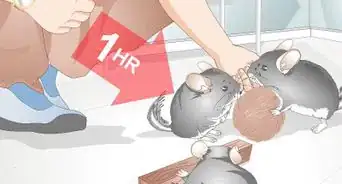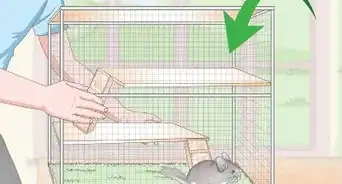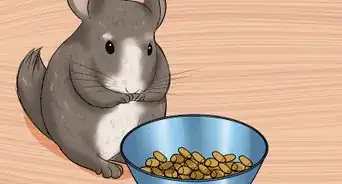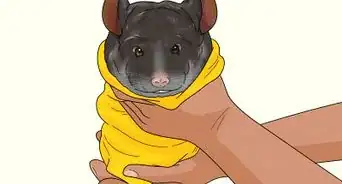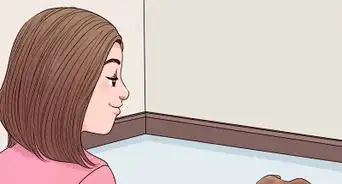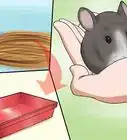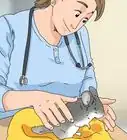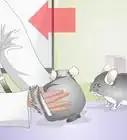This article was co-authored by Pippa Elliott, MRCVS. Dr. Elliott, BVMS, MRCVS is a veterinarian with over 30 years of experience in veterinary surgery and companion animal practice. She graduated from the University of Glasgow in 1987 with a degree in veterinary medicine and surgery. She has worked at the same animal clinic in her hometown for over 20 years.
This article has been viewed 17,488 times.
Chinchillas make wonderful pets with their lively personalities, but they can also face a variety of health problems. If your chinchilla is behaving abnormally or appears to have a distended belly, then bloating and gas might be to blame. It's important to take your chinchilla to the vet immediately, as bloating can actually be a sign of a life-threatening condition. To keep your chinchilla from bloating again, feed it a consistent diet with only limited portions of healthy snacks.
Steps
Diagnosing Your Chinchilla
-
1Look for a belly that is distended and painful to the touch. You'll likely notice that your chinchilla's belly is pushed outward. The skin will appear stretched thin and will feel tight to the touch. Your chinchilla might also shy away if you try to gently rub its stomach, which means that it is in pain.[1]
- Bloat can make the entire abdomen appear distended or a severe bump might only develop in one part of the stomach or intestines.
-
2Watch for signs of general digestive upset. An affected chinchilla might eat less food or stop eating entirely. It could act lethargic and refuse to move or interact. It might hunch over or stretch out with its abdomen exposed in an attempt to relieve the pain.[2]Advertisement
-
3Differentiate bloat from other digestive issues. A chinchilla with constipation will not pass feces. However, a chinchilla with bloat will usually continue to pass pellets, although they may be hard in texture or covered in mucus. A chinchilla with bloat will also continuously press its stomach against the ground, which is not a sign of general digestive problems.[3]
- If your chinchilla stops eating or drinking, at some point they will stop passing feces as well. This is a sign that you need to visit the vet for treatment, as dehydration and malnutrition are a possibility.
- A chinchilla with bloat may also breathe rapidly, which is usually not a sign of other digestive ailments.
-
4Expect the quick on-set and development of symptoms. A chinchilla can go from perfectly fine to ill in 2-3 hours or less. Bloating cannot usually be treated successfully at home and can lead to mortality. That is why it's important to take your chinchilla to the vet as soon as you notice any symptoms of digestive upset or pain.[4]
Caring for Your Chinchilla
-
1Massage your chinchilla's abdomen very carefully. Set your chinchilla on your lap facing towards you. Support it with your hand and position it so that its hindquarters are slightly elevated above its head and upper body. Use 1-2 fingers of your free hand to massage small circles between your chinchilla's rib cage and pelvis.[5]
- There is no set amount of time that works best for this type of abdominal massage. Stop after you've covered most of the abdominal area.
- Apply gentle pressure with your fingertips until you can feel the gas inside slightly pushing back against you. It's important not to push too hard or you could injure your chinchilla's abdomen.
- Your chinchilla might try to squirm around a bit mid-massage. If this happens, don't worry about elevating their hindquarters, just hold them gently in place on their back and continue the massage.
-
2Take your chinchilla to the vet for treatment. Your vet will conduct an abdominal examination to determine if there are any obstructions in your chinchilla's digestive system. They might also do a mineral oil enema or apply a heating pad to your chinchilla's abdomen. If these treatments aren't effective, then you may need to consider surgery to relieve the gas pressure.[6]
- One surgical option for relieving bloating is as simple as passing a transabdominal needle into your chinchilla's midsection in order to siphon out the gas.
- If the bloating isn't extreme and your chinchilla isn't in pain, your vet might suggest admitting your animal and monitoring it overnight.
-
3Give any antibiotics as prescribed. If a fecal culture indicates that your chinchilla is suffering from gastrointestinal (GI) bacterial growth, then your vet will likely prescribe antibiotics. The medicine will be in liquid form and you'll need to follow your vet's instructions to administer it. A usual course of antibiotics lasts between 10-14 days.[7]
- Chinchillas can actually choke on pills, so they are almost never prescribed. If your vet suggests an antibiotic in pill form, discuss a liquid alternative with them.
-
4Restrict your chinchilla's movement during recovery. Your vet will give you a specific recovery timeframe for your pet. If your chinchilla moves too much, it can actually lead to additional intestinal problems. Move your chinchilla to a single-level cage to discourage jumping. Play calming music to keep it from getting agitated and restrict visitors to the cage room.[8]
- Separate your chinchilla from other pets or other chinchillas during this period, too.
-
5Bring your chinchilla to the vet for a follow-up visit. Your vet will usually request that you return for another check-up between 1-8 weeks after the initial bloating incident. It's important to keep this appointment because your vet will examine your chinchilla for any long-term problems, such as intestinal prolapse.
Preventing Digestive Problems
-
1Feed your chinchilla a hay and pellet-based diet. Talk to your vet about a quality chinchilla pellet food that provides sufficient vitamins and minerals. Give your chinchilla 2 tablespoons (20 g) or less of pelleted food each day. Supplement this with access to hay in an amount determined in consultation with your vet.[9]
- If you need to make a switch between pellet or hay types, it's important to do so gradually. Quick dietary changes can cause stomach upset for chinchillas.
-
2Give your chinchilla healthy and safe snacks. Chinchillas love to snack, but they can get sick from eating the wrong thing or overeating. Some chinchilla-appropriate snacks include mountain ash berries, apple wood sticks, or dandelion leaves. Most of these will need to be purchased online from pet food retailers.[Image:Deal with Bloat in Chinchillas Step 11.jpg|center]]
- Portion control is important for chinchillas. Three mountain ash berries, 1 applewood stick, or ½ teaspoon (0.57 g) of dandelion leaves is enough of a snack per day.
- Avoid snacks that contain corn products, chocolate, nuts, seeds, or any animal products. Milk or yogurt, for example, can make your chinchilla very sick.
- Don't feed your chinchilla vegetables that could cause gas, such as brussel sprouts, cabbage, or kale. These could cause painful distension in the chinchilla's abdomen.
-
3Provide your chinchilla with continual access to clean water. Give your chinchilla water via a cage bottle made especially for rodents, rabbits, or chinchillas. Empty and refill the water bottle daily or as soon as you notice that it's empty. If your chinchilla refuses to drink regular tap water, try providing distilled or filtered water instead.[10]
- Do not give your chinchilla water via a crock or bowl, as these can be tipped over quite easily.
- If the water bottle is not partially empty at the end of each day, check the tip of the bottle with your finger to make sure it's still functioning properly. Simply press your finger against the bottle tip and watch to see if water comes out.
- Dehydration is a primary cause of bloating and illness for chinchillas.
-
4Keep foreign objects away from your chinchillas. Digestive upset and bloating can be caused by chinchillas eating material that is harmful or dangerous to them. Carpet fibers, small pieces of wood, cat litter, and even hair can damage a chinchilla's stomach or intestines. Check their cage daily for the presence of any foreign materials.[11]
- If you let your chinchilla outside to play, make sure to check the space for potentially dangerous materials, too.
-
5Keep your chinchilla's stress levels low. This may seem easier said than done, however, elevated stress levels can lead to gut problems. Handle your chinchilla gently and with care. Provide it with a hiding box in its cage, so that it can de-stress. Be cautious with environmental changes, such as introducing new pets.[12]
- Treating any health issues that your chinchilla suffers from, such as liver disease, can also reduce its stress levels.
Warnings
- If you notice that your chinchilla is experiencing difficulty breathing or if you see bloody stools, take them to your pet to the vet immediately. It's possible that the bloating could be a sign of a larger abdominal problem.⧼thumbs_response⧽
References
- ↑ https://www.dvm360.com/view/how-i-treat-gastrointestinal-stasis-small-herbivores-proceedings
- ↑ https://www.dvm360.com/view/how-i-treat-gastrointestinal-stasis-small-herbivores-proceedings
- ↑ https://www.foreverfeistychinchilla.org/health-issues-a-c.html
- ↑ https://www.dvm360.com/view/how-i-treat-gastrointestinal-stasis-small-herbivores-proceedings
- ↑ https://www.foreverfeistychinchilla.org/health-issues-a-c.html
- ↑ https://www.dvm360.com/view/how-i-treat-gastrointestinal-stasis-small-herbivores-proceedings
- ↑ https://www.dvm360.com/view/how-i-treat-gastrointestinal-stasis-small-herbivores-proceedings
- ↑ http://www.chincare.com/HealthLifestyle/HealingDigestive.htm
- ↑ http://www.nelsonroadvet.com/articles/exotics/pocket-pets/chinchillas/
